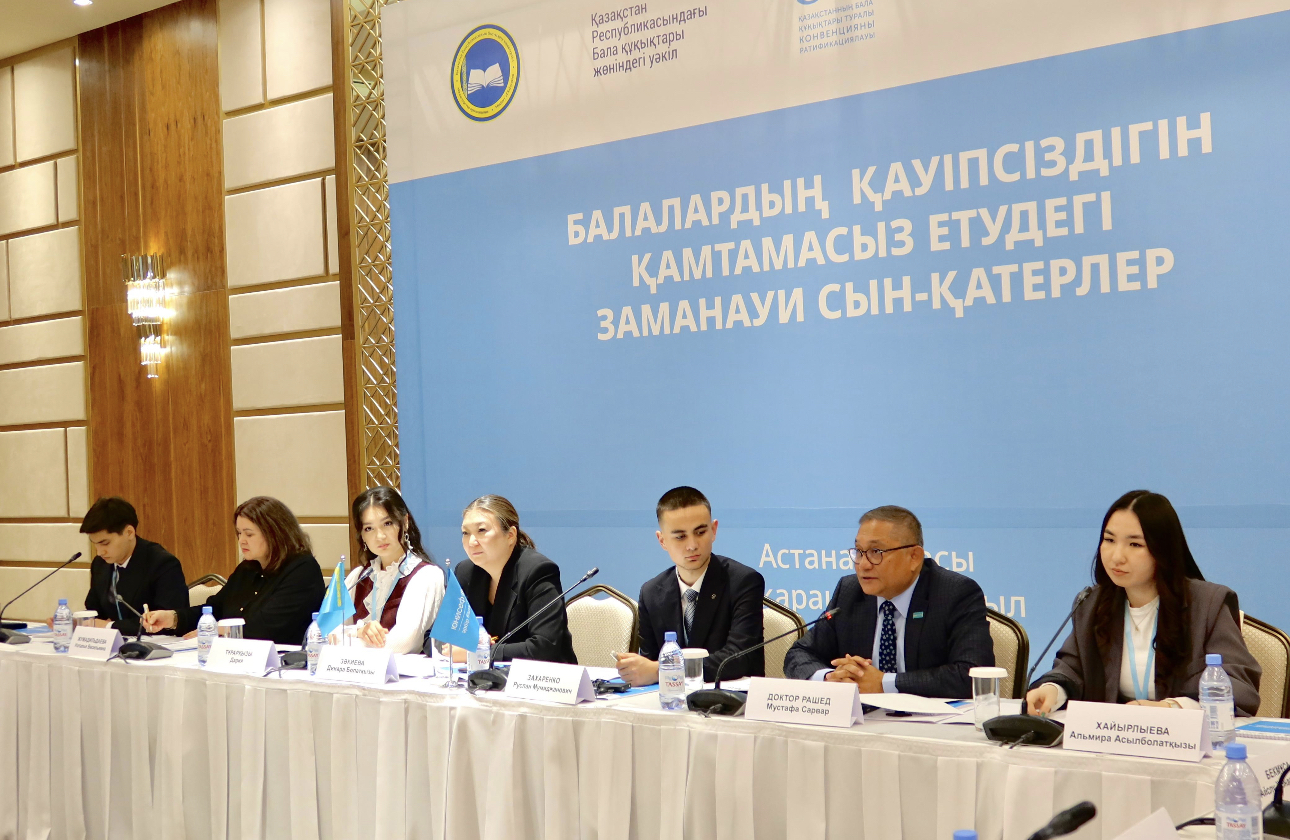ASTANA – Kazakhstan celebrated the 35th anniversary of the adoption of the UN Convention on the Rights of the Child (CRC) on Nov. 20. This year also marks 30 years since the country ratified the treaty, a pivotal moment in advancing children’s rights.

Astana hosted a meeting of 50 child ombudspeople nationwide and UN Children’s Fund (UNICEF) representatives to address modern challenges facing children on Nov. 20. Photo credit: the UNICEF press service
Key achievements in child protection
Kazakhstan has made significant strides in safeguarding children’s rights over the past three decades. The Committee for the Protection of Children’s Rights was established in 2006, followed by the introduction of the Ombudsperson for Children’s Rights in 2016. In 2022, regional children’s rights commissioners began operating nationwide to enhance local child protection efforts.
The government launched a national Child Well-Being Index to monitor and compare children’s conditions across regions using international benchmarks. Kazakhstan has also ratified key international agreements, including the CRC’s two Optional Protocols, reaffirming its commitment to international standards.
Nasymzhan Ospanova, the committee’s chairwoman, emphasized the need for a comprehensive approach to ensuring children’s safety and well-being.
“All educational institutions in the country are equipped with safety measures, including building security systems, public space monitoring, and safe infrastructure near schools,” Ospanova told Baigenews news agency.
In 2023, Kazakhstan adopted a Comprehensive Plan for Child Protection until 2025, focusing on preventing violence, reducing suicides, and ensuring children’s rights. Psychological support centers have been established nationwide, with over 460 specialists assisting children, parents, and teachers. By October, more than 40,000 students had sought help from these centers. Families also have access to support via the 111 hotline.
To address risks to children’s rights, an Interactive Risk Map was developed to highlight issues such as bullying, family welfare, and psycho-emotional health. In 2023, a methodology for early detection of violence and bullying and a support program for abuse victims were introduced.
According to Ospanova, the country also launched anti-bullying initiatives, including the Finnish KiVa Program and the local Dosbollike Initiative, to foster positive school environments.
Weekly personal safety lessons were added to school curriculums, teaching children emergency phone numbers, how to avoid cyberbullying and safety from strangers.
In 2024, several legislative measures were enacted, including stricter penalties for violence against children, mentorship programs for orphans, and mandatory safety features in high-rise buildings.
Efforts to improve digital safety were also strengthened. Campaigns such as Parental Control and Cyber Tumary aimed to boost children’s digital literacy and ensure safe online experiences.
International cooperation
Astana hosted a meeting of 50 child ombudspeople nationwide and UN Children’s Fund (UNICEF) representatives to address modern challenges facing children on Nov. 20, reported the UNICEF press service.
The program featured three key modules, with child ombudsmen serving as speakers. The first module focused on youth legal literacy, the role of families in protecting children, and encouraging children and young people to advocate for their rights. The second module explored online safety, including cyberbullying, protecting children on social media, and the importance of parental involvement in ensuring digital security. The third module examined environmental challenges, emphasizing youth engagement in environmental protection and addressing the impact of climate change.
UNICEF Representative in Kazakhstan Dr. Rashed Mustafa Sarwar praised Kazakhstan’s progress.
“Today, we reaffirm our commitment to the principles of the CRC, working together for a safer and more sustainable future for our children,” he said.
“Children’s voices are essential when addressing issues and decisions related to their rights,” said Dinara Zakieva, Kazakhstan’s Commissioner for Children’s Rights, emphasizing the need for meaningful dialogue with young people.
Challenges and areas for improvement
Despite progress, systemic deficiencies in child protection mechanisms remain, according to the General Prosecutor’s Office. Issues include inadequate services for troubled children, inefficiencies in psychological services, and insufficient preventive measures.
Juvenile delinquency remains high, with 1,735 cases reported in 2022, rising to 1,925 in 2023. In the first nine months of the year, 1,267 cases were recorded.
The Ministry of Education has developed a roadmap with 51 measures to address these challenges. Initiatives include modernizing special education institutions, creating rehabilitation programs for children with behavioral issues, and increasing staffing in guardianship services.
Currently, one guardianship employee oversees up to 17,000 children, far exceeding international standards of 1,000–5,000 children per worker. The prosecutor’s office supports introducing legal limits on caseloads.
The ministry also aims to enhance the role of school psychologists by limiting workloads to 500 students per psychologist.
By the end of the year, the ministry plans to launch initiatives to immerse troubled youth in positive environments, including mentorship programs and enrollment in military-patriotic clubs such as Zhas Sarbaz and Zhas Burkit.
